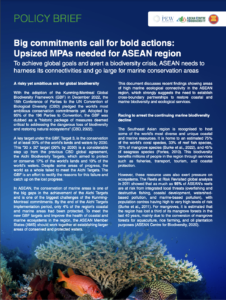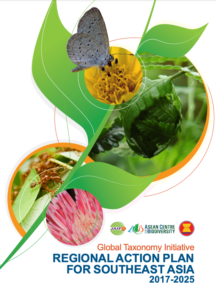Bangkok, Thailand | 5-6 February 2024
To Dr. Vong Sok, Head of the Environment Division, Assistant Director of the
Sustainable Development Director, ASEAN Secretariat;
Dominik Fortenbacher GIZ Project Director, Institutional Strengthening of the
Biodiversity Sector in ASEAN (ISB II) Project;
For. Marcial C. Amaro, Jr., Director of the Biodiversity Management Bureau,
Department of Environment and Natural Resources, Philippines, and Chair of
the AWGNCB (TBC);
Representatives from the ASEAN Member States, ASEAN Secretariat, various
dialogue partners, and ACB colleagues,
Sawasdee ka! Good morning and Happy Lunar New Year in advance!
I am pleased to see all of you in person today to share and discuss significant progress made in ASEAN on the One Health approach, a global response to complex problems that require multidisciplinary and holistic solutions that are cost-effective, sustainable, and practical. Take for instance the coronavirus disease or COVID-19. You may probably think that by this time, with all our COVID-19 restrictions across AMS having been lifted, the pandemic is slowly fading into memory. However, during the World Economic Forum held in January, experts gathered in Davos to prepare for the possible emergence of a pathogen that is even deadlier than COVID-19, dubbed as Disease X. This is to ensure that governments are better prepared in case another pandemic hits the globe.
For a region that is undergoing rapid economic growth—where land-use change is a consequence of accelerating infrastructure development; where farming and fisheries continue to be the main sources of livelihood for its people; and where culture and traditions allow wildlife consumption for subsistence—a strategic response mechanism such as One Health becomes more viable. Harmonising policies on public health, livestock and poultry production, and biodiversity, including wildlife protection and trade to consider their interconnection and relevance to disease control and prevention will be essential to reducing the risks associated with future pandemics.
We, at the ASEAN region, are on the right track to better prepare for this Disease X or any other future diseases, as we have the ASEAN Comprehensive Recovery Framework (ACRF) and Implementation Plan adopted in 2020 designed as a blueprint to recover from the COVID-19 pandemic and build back better. In 2022, the ASEAN Strategy for Preventing Transmission of Zoonotic Diseases from Wildlife Trade (2022–2025) was affirmed. And just last year, ASEAN also adopted the Leaders’ Declaration on One Health Initiative, which gave birth to the ASEAN One Health Network and the ASEAN One Health Joint Plan of Action. These two significant milestones are already in place and are clear high-level guidance on how the region must move forward on building pandemic resilience. We just need to facilitate translating these policies into action on the ground, with an inclusive, well-coordinated, whole-of-society level of participation.
This Technical Forum is one of the first steps at the regional level towards this end. It is one of the important recommendations based on the outcome of the series of webinars on biodiversity, zoonotic diseases, and One Health co-organised by the ASEAN Secretariat and the ACB during the pandemic in May and in November 2020.
What do we hope to achieve in this two-day forum? The first and most important, is to enable ASEAN sectoral bodies to exchange views and discuss harmonisation and alignment of their respective sector-focused activities with the planned action plan for the ASEAN Leaders Declaration on One Health Initiative.
Second, we would like to determine areas of collaboration among emerging centres and related projects and initiatives to take into account the rich biodiversity, and the natural wealth that the ASEAN region is known for, and has not yet fully harnessed. This is where we could advance ASEAN initiatives significantly, highlighting the role of the environment sector in One Health, aligned with efforts of the quadripartite alliance of the Food and Agriculture Organization of the United Nations (FAO), United Nations Environment Programme (UNEP), World Health Organization (WHO), and World Organisation for Animal Health (WOAH). The quadripartite alliance is well represented here today.
Lastly, this Forum intends to help articulate the ASEAN Theme for 2024, Enhancing Connectivity and Resilience, under the leadership of Lao PDR. I am happy to note that there are participants from Lao PDR who are here with us today to guide us in this process.
I encourage everyone here, specifically those who have ongoing efforts like zoonotic disease prioritisation and surveillance, country assessment for the environment sector, development of One Health agenda, and establishment/mobilisation of interagency/ministerial committees, to actively provide your insights on how to further engage the environment sector in pursuing its relevant role in the One Health Approach and to enhance the region’s resilience to pandemics. May this Technical Forum set the momentum for the succeeding regional discussions on One Health in the future.
I thank the ASEAN Secretariat for their support and guidance and my ACB team led by the Programmes Department, for your excellent preparations.
The ACB, with ASEC, stands ready to move forward with the recommendations that will come out from this Forum to ensure that the One Health regional and national action plans are purposive and sustained.
I wish you all the best of outcomes in the next two days.
Kop khun ka!

























